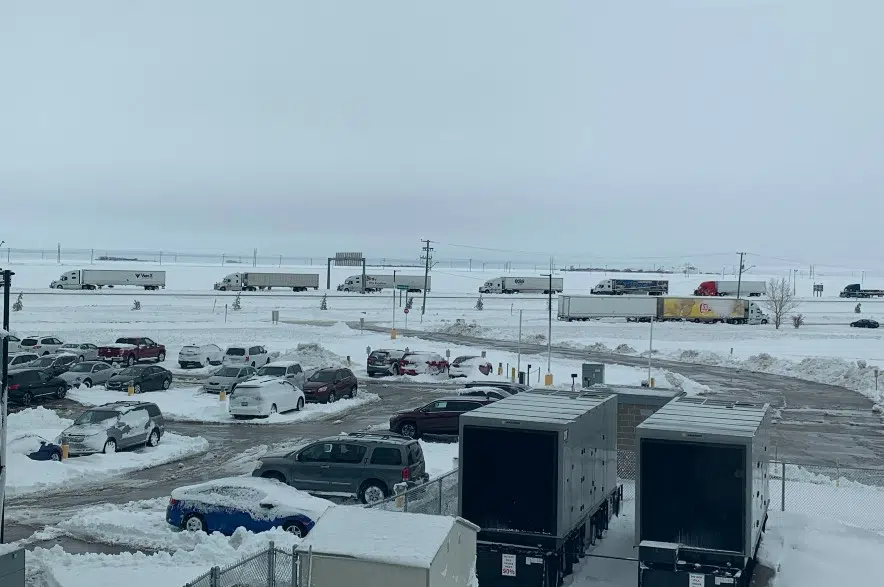The storm that hit parts of southern Saskatchewan on Sunday moved east Monday, but snowfall warnings remained in place and highways remained closed in the province.
As of Monday at 10 a.m., the Highway Hotline said the Trans-Canada Highway was closed from Mortlach to Rush Lake, Highway 39 was closed from Moose Jaw to Corinne, Highway 2 was shut down from Assiniboia to Rockglen, and Highway 36 was closed from south of Moose Jaw to the intersection with Highway 13.
Travel wasn’t recommended on a number of roads, including the Trans-Canada from Regina to Mortlach, Highway 15 from Raymore to Churchbridge, and Highway 16 from Dafoe to Sheho.
Trucker Russ Jobbagy was travelling from Red Deer when he was forced to stop in Davidson after the snow began to pick up Sunday evening.
He hunkered down for the night and thought the road would be all good to go by Monday morning after the plows cleared the snow. However, he says when he woke up, Highway 11 going towards Regina was still a big mess.
“I got into Davidson last night and the roads were getting fairly bad at that point,” he said. “I’ve been up since 5:30 (Monday) morning and been looking out the windshield since then and have not seen a snowplow go by.
“The road is ice here and it’s so warm, all they’ve got to do is run a load of salt or sand on the highway and it’ll be wet in an hour.”
Jobbagy said he was surprised there weren’t any plows out considering he was in the province this time last year and the exact same thing happened following the first snowfall.
He says Davidson was better than the conditions around the Moose Jaw area.
“It’s pretty busy here for sure. I guess around Moose Jaw is even worse; they’re just parked on the highway,” he explained.
He said in talking to other truck drivers, they’ve also echoed his words about a lack of snowplows on Saskatchewan roads.
“They have not seen plows out. They’re not out,” he stated. “I’m not sure if they’re not allowed to be out or don’t want to be out, but when the weather is this warm, it doesn’t take much to get rid of it.”
Jobbagy added he’s going to wait it out until the roads clear up. He said trucks currently are only able to go about 30 kilometres per hour because of the road conditions.
Environment Canada
Snowfall warnings were still in place in the areas around Kamsack, Canora, Hudson Bay, Porcupine Plain, Pelican Narrows and Creighton. According to Environment Canada, 10 to 20 centimetres of snow were expected in those areas.
As well, there were winter storm warnings in place for the Yorkton, Melville, Moosomin and Grenfell regions.
The weather service said freezing rain had developed and was to change to heavy snow late Monday morning.
“Accumulating freezing rain is possible along both the Trans-Canada Highway and Yellowhead Highway corridors,” Environment Canada said. “Storm total snowfall of 10 to 20 cm is expected.”
The storm left behind some significant accumulations, power outages and traffic jams.
“As far as snowfall totals, just judging from the pictures we’ve seen, it looks like we could’ve seen 10 to 15 centimetres in the Moose Jaw region,” Environment Canada meteorologist Kyle Ziolkowski said Monday morning. “In Regina, it looked like maybe five centimetres fell there.”
In Regina, the roads Monday morning could be described as slick and a little wet in some areas, but nothing like what people around Moose Jaw saw.
In the areas surrounding Moose Jaw, highways were closed and traffic was gridlocked thanks to all the snow that accumulated throughout the region.
The weather led the City of Moose Jaw to suspend public transit service Monday morning. There wasn’t any word on if the public transportation system would operate Monday afternoon.
Ziolkowski said the worst of the storm has passed, despite the snowfall warnings still being in place for some eastern parts of the province.
“Things will kind of clear out as the day moves along,” he said. “There is a little disturbance that is going to come in overnight (in Regina) and it could give you a little skiff of snow, but it’s not going to be anything significant.”
While southern Saskatchewan got hit with this blast of winter, it appears it will be a brief one. The forecast for the next week in most southern Saskatchewan communities has temperatures bouncing back into the pluses and no snow in sight.
Ziolkowski said a low-pressure area from Colorado is to blame for the storm we received.
“What happened was we had a Colorado Low that developed in the U.S. and it started to swing up into the northern U.S. plains and it started dumping some snow over southeastern and south central Saskatchewan,” he said.
“Cypress Hills also got hit pretty good with some snow. Kind of along the Trans-Canada Highway, it looked pretty bad judging by social media pictures. That’s what we saw for the impacts from this storm.”
— With files from 980 CJME’s Shane Clausing







